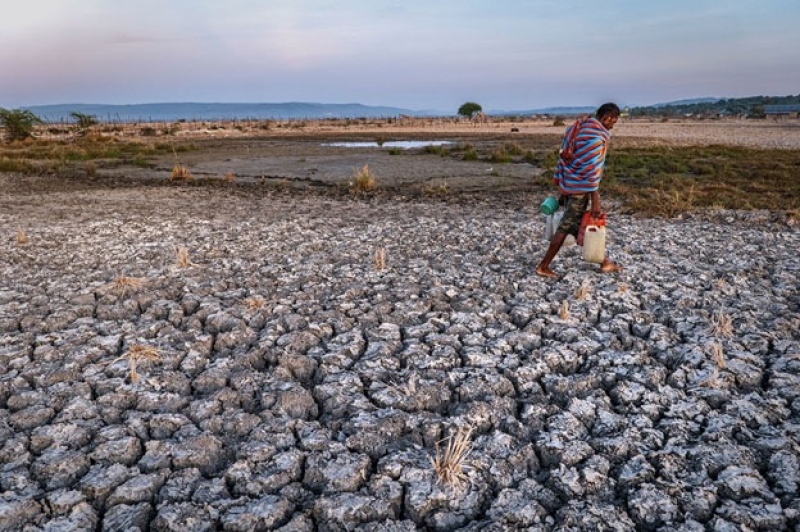- Alamdanga’s disabled Zahurul sees the world through his hands |
- Touhid dismisses Indian media reports linking Dhaka for Delhi blast |
- IOM, HCI partner to combat human trafficking in Rohingya camps |
- Gold price goes up again in Bangladesh |
- Suicide bomber targets Islamabad court, killing 12 people, wounding 27 |
Why Global Tax Justice Is Key to the Climate Crisis

Credit: UNICEF
The climate crisis is worsening and demands fundamental changes to societies, economies, and the global financial system. As extreme economic inequality grows — with the world’s billionaires now holding more wealth than every country except the United States and China — the impacts of climate change are being felt most acutely by the poor, both in the Global South and the Global North.
This month, two major UN events are taking place to address the climate crisis and global financial reform. The first — the 30th UN Framework Convention on Climate Change Conference of Parties (COP30) — will take centre stage in the Brazilian city of Belém. Meanwhile, on another continent, Nairobi will host a lesser-known but equally vital meeting focused on global tax justice.
Beginning on November 10, negotiators from UN member states and civil society organisations gathered in Nairobi for formal discussions on a proposed UN Framework Convention on International Tax Cooperation. The goal is to create a fairer global tax system that could provide much-needed resources for climate action.
It is striking that two major UN meetings — one on climate, the other on tax — are taking place simultaneously, yet worlds apart. In Belém, discussions will focus on how Global North countries have failed to meet their climate finance commitments to the Global South. But what often goes unmentioned is the need to reform global tax rules that deprive developing nations of the resources they need to tackle climate change themselves.
A recent UN Environment Programme (UNEP) report found that developed nations provided just $26 billion in international adaptation finance to developing countries — far below the $40 billion pledged annually at the 2021 Glasgow COP. The report estimates that adaptation costs could rise to between $310 billion and $365 billion per year by the mid-2030s. Yet it remains silent on global tax reform as a potential solution to this growing funding gap.
Global tax justice must therefore be central to addressing the “yawning gap” between climate finance commitments and actual needs. According to the OECD, countries lose an estimated $100–240 billion in tax revenue each year due to profit shifting by multinational corporations — with Global South nations bearing a significant share of these losses. Recovering even part of this lost revenue could far exceed current aid flows from the Global North.
As major donor countries reduce or eliminate their aid budgets, the world must adopt a post-aid approach to climate finance. This means shifting the focus from charity to justice — demanding that global tax systems enable countries to tax economic activity where it truly occurs.
Fair and progressive taxation must become a cornerstone of this new approach, empowering Global South countries to fund their own climate resilience efforts.
While thousands of climate activists converge on Belém, a smaller but determined coalition of civil society groups, organised by the Global Alliance for Tax Justice, is pushing for new and effective tax rules in Nairobi. These reforms would ensure that multinational corporations — including those driving the climate crisis — pay their fair share.
Beyond closing loopholes, countries must also remove tax subsidies that encourage fossil fuel production. In the United States, research by the FACT Coalition shows that American taxpayers are effectively subsidising overseas oil drilling. Other studies indicate that tax breaks can make otherwise unviable oil and gas projects appear profitable.
Encouragingly, some conversations are beginning to bridge the gap between climate action and tax reform. Academics and activists recently met in Brazil for a policy research conference, declaring that the “convergence of climate justice and tax reform is an ethical, political, and economic imperative.”
Foreign aid alone cannot solve the crisis, and private investment remains limited due to misaligned incentives. Once the meetings in Belém and Nairobi conclude, governments, international organisations, and activists must work together to link climate and tax agendas — creating a unified approach to tackle global inequality and the climate emergency.
Such cooperation would mark a decisive step forward — a win for both people and the planet.
— Ian Gary, Executive Director of the Financial Accountability & Corporate Transparency (FACT) Coalition

